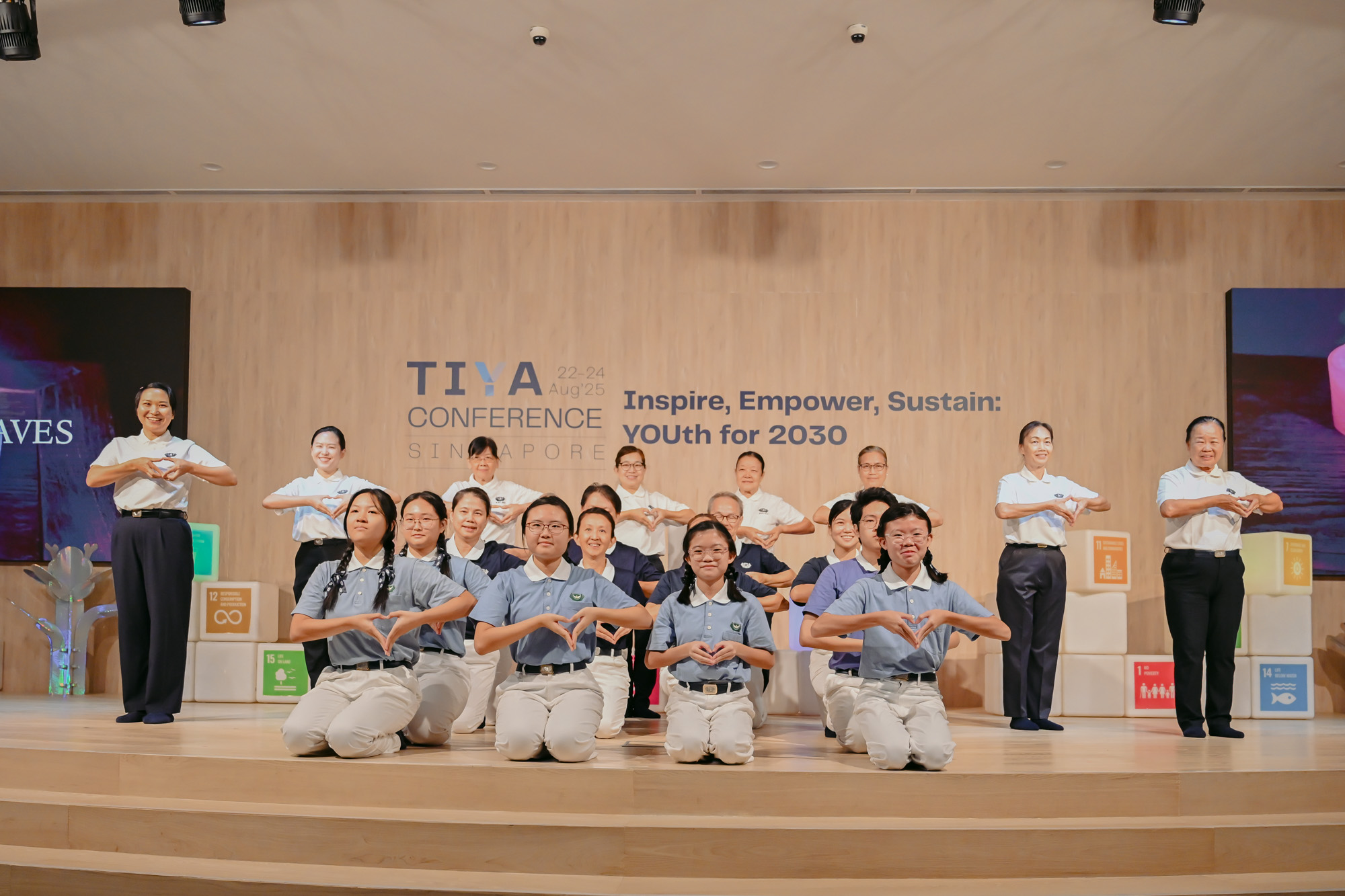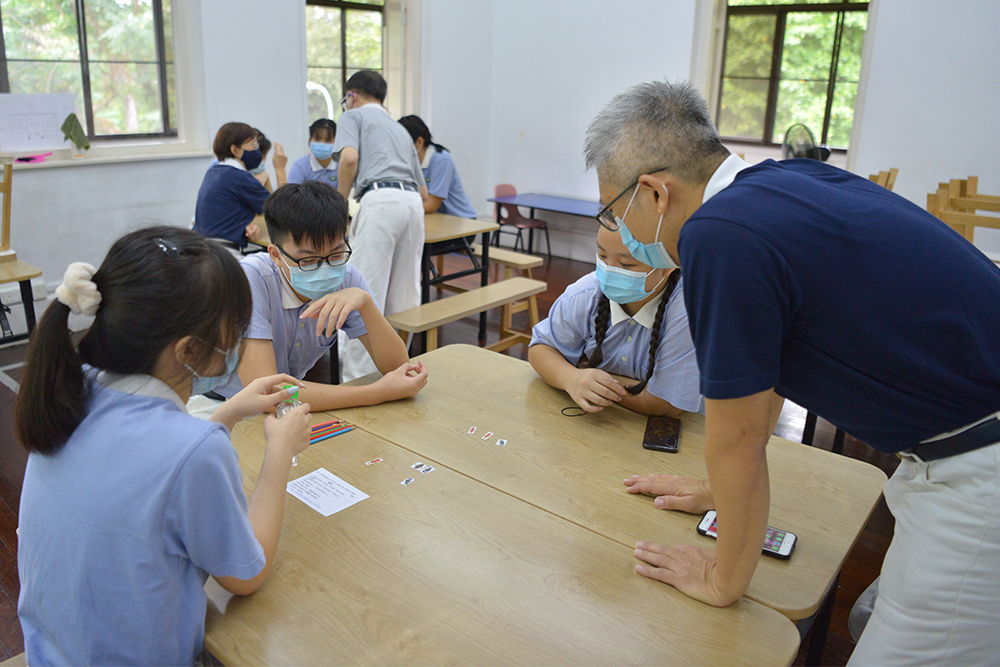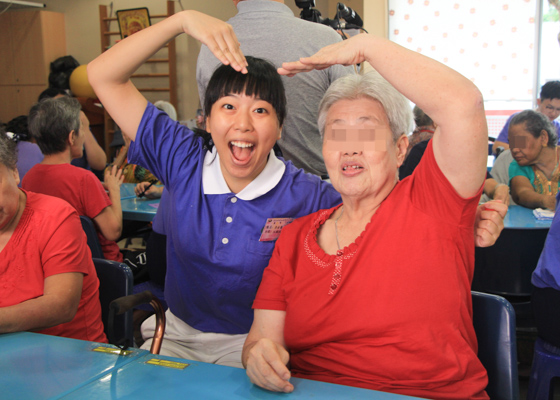
Nearly two hundred energetic youths combined their strengths through the TIYA Conference 2025, igniting the passion for a sustainable future. (Photo by Donn Tan)
"Sustainability cannot stop at national borders," emphasised Ms Goh Hanyan, Senior Parliamentary Secretary for the Ministry of Sustainability and the Environment & the Ministry of Culture, Community and Youth, as she urged nearly two hundred youth attendees. "And in our region, the stakes are high when it comes to sustainability and climate change. Flooding is from peeling fires, rising sea levels, higher than with stellos, increasing urban heat temperatures. And that sounds too much gloom. But there's a bright spot here that our region has one of the largest youth populations. It is a very young part of the world, and if you harness the energies of youth like you in the room, connecting across borders, sharing solutions, change will not just add up, it will multiply and expand in faster paces than you've actually seen.”
The 2025 TIYA Conference, relocated from Taiwan to Singapore for the first time, was held from August 22 to 24 at the Tzu Chi Humanistic Youth Centre (HYC). It promoted youth awareness and implementation of the United Nations Sustainable Development Goals (SDGs) from diverse perspectives. It also sought to nurture youth leadership, collaboration, and innovation. Youth from fourteen countries engaged in three days of exchanges, discussions, and hands-on activities under the theme "Inspire, Empower, Sustain: YOUth for 2030".
Sustainability Begins with Individual Action
Speaking at the opening, Senior Parliamentary Secretary Goh Han Yan, who was also the Guest of Honour, highlighted, “When we talk about sustainability, it often feels like some big, hairy, global challenge. I think this conference reminds us that progress starts small, right, with individual actions, with communities taking the lead.”
This year’s conference focused on SDG 6 (Clean Water and Sanitation), SDG 7 (Affordable and Clean Energy), SDG 9 (Industry, Innovation, and Infrastructure), SDG 11 (Sustainable Cities and Communities), and SDG 17 (Partnerships for the Goals).
Over the three days, representatives from UN-affiliated organisations, international non-profit organisations, and social enterprises generously shared their expertise and practical experiences in cases aligned with the SDGs.
Yen Po-Wen, CEO of Tzu Chi Charity Foundation, said that as a metropolitan city, Singapore’s environment and efficient transportation system make it more attractive for international youth participation compared to Taiwan. He was happy to see youth from many countries gathered onsite, helping to spread the Tzu Chi spirit and the Sustainable Development Goals. He also encouraged the youth to stay open-minded, share bravely, and unleash their potential to push the world towards a better future.
"It is a double joy for us this year that the TIYA Conference is held in Singapore for the first time, especially since Singapore is celebrating its 60th birthday," said the CEO of Tzu-Chi Foundation (Singapore) Low Swee She, as he warmly welcomed all visitors and thanked the representatives from the UN, government, business industry, and non-profits for their strong support.
Multiple Perspectives on Sustainability
On the first day, youth focusing on SDG 6 (Clean Water and Sanitation) split into two groups to visit the Sustainable Singapore Gallery and learn about the indigenous Orang Laut culture.

In the Orang Laut culture experience, youth smashed their harvested herbs "Pokok Dukung Anak“, and mixed it with turmeric and water. This mixture helps postpartum women recover energy. (Photo by Donn Tan)
Clarisha Tanadia Adrian Tan, a fresh graduate, shared that although she grew up in Singapore, she was unfamiliar with the Orang Laut community. Through the conference, she learnt that Pulau Semakau, was once inhabited by the Orang Laut before it became the national landfill and as they moved away from the island, they lost their indigenous voices.
Youth Ambassador Rachel Cheang shared that while people usually associate sustainable development with technology and modernisation, indigenous Orang Laut issues deserve discussion too. She believes that sustainable development must be pursued with fairness. Beyond the government and large agencies, the voices of marginalised groups like the Orang Laut should also be heard. This approach would help avoid sacrificing vulnerable populations from being overlooked and promote more inclusive solutions.

Youth participants learning about Singapore’s environment and water issues through engaging activities. (Photo by Tan Shay Ching)
Er Qin Wei, a participant from Malaysia, acknowledged that Malaysia has inadequate systems for wastewater recycling and clean water, and hopes that Malaysia can learn from Singapore to reuse wastewater and reduce marine pollution.
Access to energy supply is a basic human right
During the SDG 7 discussion, keynote speaker Tonibung Adrian Lasimbang emphasised that energy access is a basic human right and shared innovative practices from Sabah and Sarawak.

In the keynote discussion, Tonibung Adrian Lasimbang and Dr David Broadstock mentioned examples of feasible renewable sources of energy. As someone in the media industry, Gabrielle See (first from right) shared the importance of upholding justice and objectiveness in media reporting. (Photo by Yeo Chee Hwang)
Tonibung’s non-profit organization, CREATE, has developed micro-hydropower and solar technologies to supply electricity for hundreds of people while inculcating self-management in the community and ensuring system sustainability. Their work also combines energy infrastructure development with youth skills training, helping indigenous youth avoid urban poverty by providing educational opportunities.
“Energy is inseparable from education, health, and wellbeing,” said Natasya Pustika Siregar from Indonesia. She discussed promoting plastic recycling with Tonibung, hoping to raise better recycling awareness in schools and communities in her city. Natasya shared, “The city I live in has not yet established a comprehensive recycling system. If awareness about this could be promoted in schools and local communities, it would be very valuable.”

Natasya Pustika Siregar (right) and Bella Citra Hadini (left) signed up for a tea ceremony workshop to learn more about Chinese tea culture. (Photo by Donn Tan)
Bella Citra Hadini, an Indonesian graphic designer, gained inspiration from the workshop and planned to leverage her professional skills to design posters for promoting energy management knowledge.
Building a platform for youth cooperation
The TIYA Conference provided youth from many countries with a platform for exchange and learning, opening up their vision and horizon.
Sarmila Khanal from Nepal, who took her first international flight to attend the event, found Singapore to be friendly and welcoming through genuine cultural exchanges.
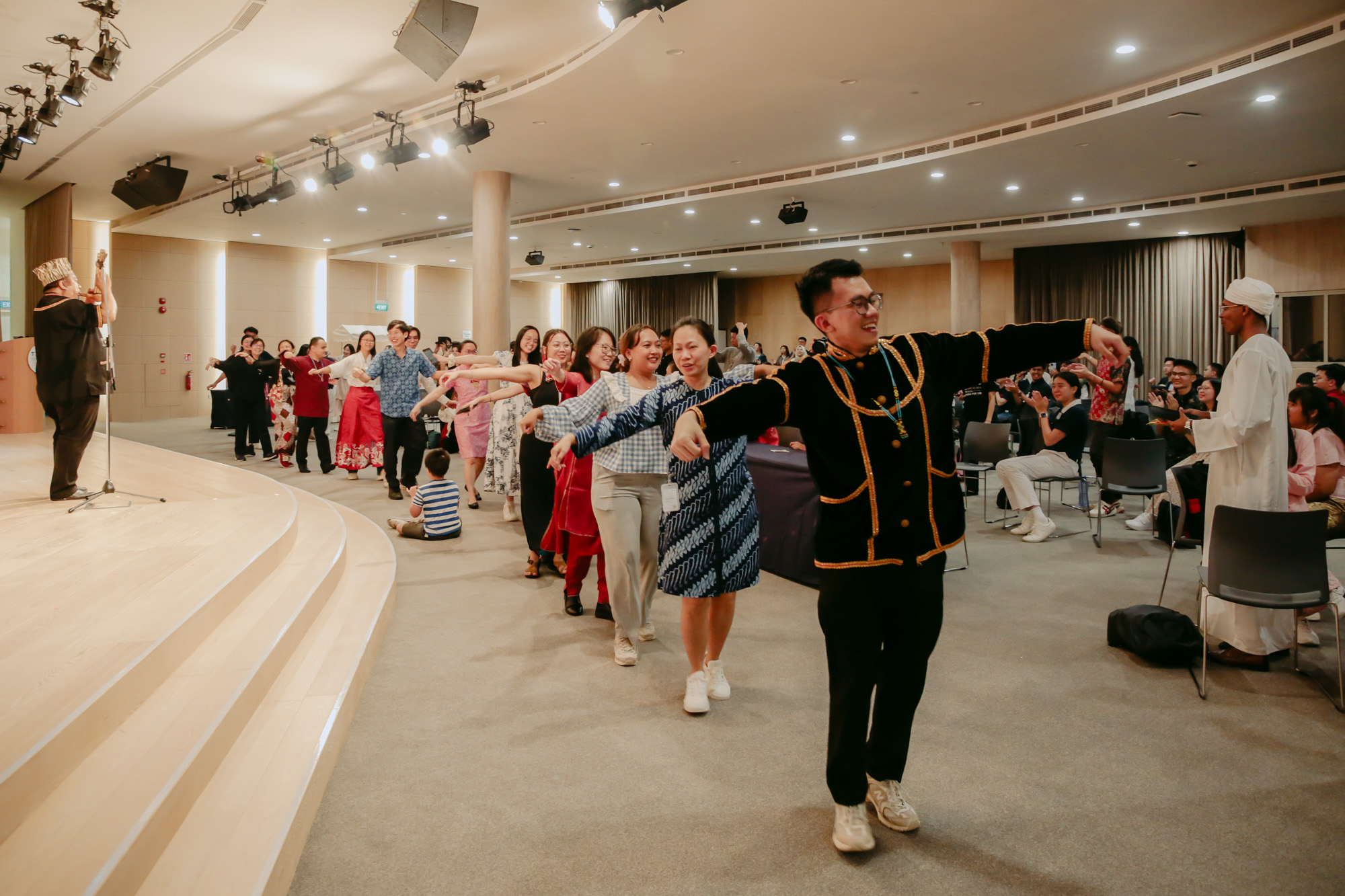
The “Youth Night” on the second night brought together young people from different countries for cross-cultural exchange. (Photo by Fong Kwai Kin)
Sarmila, a department head at the Health Environment and Climate Action Foundation, was impressed by Singapore’s Marina Barrage and learnt how to cherish water resources and reduce carbon footprints. She plans to bring these sustainability concepts home to better implement SDG 6. Discussions on SDG 11 (Sustainable Cities and Communities) also broadened her views on improving rural living environments.
Aung Hein Thant, a participant from Myanmar and working for the UN in Jakarta, said the conference inspired him deeply. He felt the warmth and enthusiasm everywhere, with everyone greeting him with smiles and actively contributing to the creation of better communities.
Participant Clarisha Tanadia Adrian Tan also shared that through the conference, she not only engaged in experience-sharing with others but also broadened her worldview as she gained insight into the realities of other countries.
On the final day, the "Action Plan Development II" session aligned with SDG 17, allowing youth to exchange ideas with industry leaders and create collaboration opportunities to develop future action plans, turning imagination into reality and building a more sustainable future together.
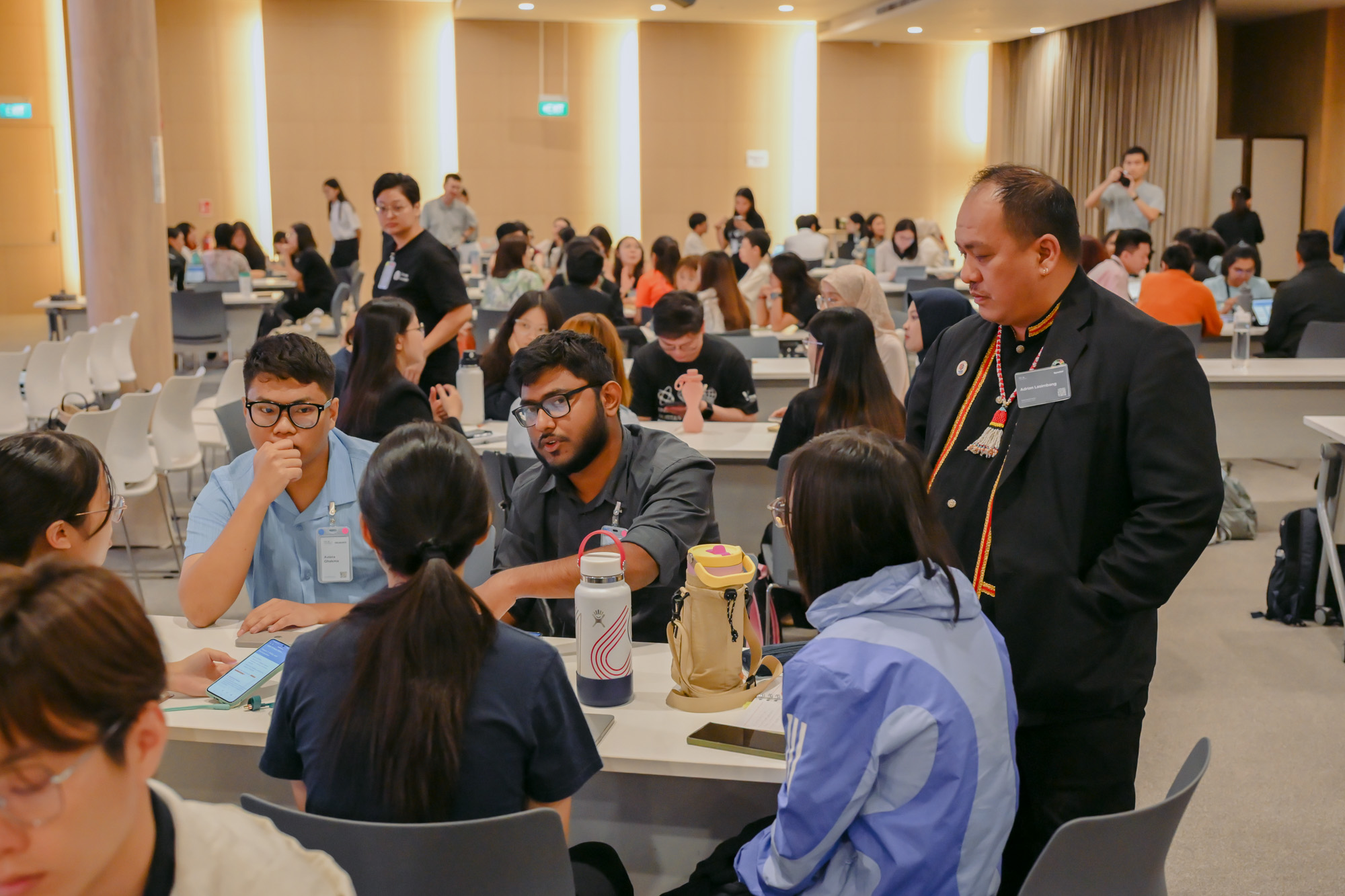
Youth actively participated in group discussions led by experienced speakers, step-by-step turning ideas into actionable plans. (Photo by Lim Swan Chow)


